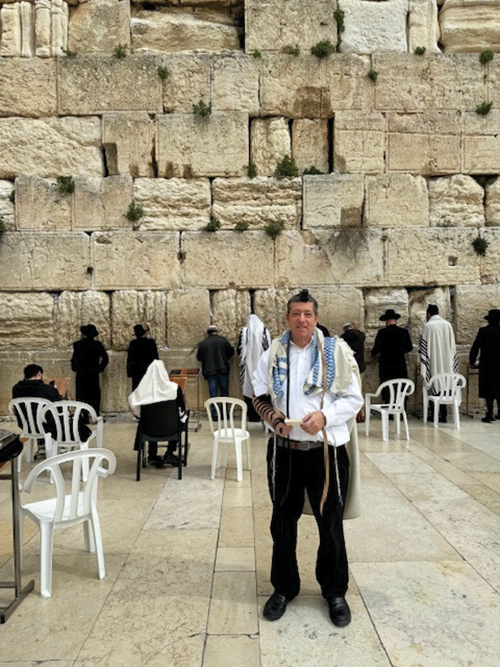
I recently returned from my third trip to Israel following the October 7 Hamas massacre. Each trip has its positive highlights as well as myriad sad moments and emotional tugs and feelings of pain. This trip was no different.
The two prime objectives for Israel remain the return of all the hostages and the destruction of the Hamas military network. There are other objectives as well, but these are the two priority objectives.
The most inspiring theme from this trip—and from all three trips—is the continuing amazing unity of the Jewish people (in Israel) during this post-October 7 period despite all the tragedies, unrelenting terrorist attacks (not just from Hamas in Gaza) and the completely predictable yet absurdly unwarranted and unfair dissipation of “goodwill” and understanding of Israel’s position post-October 7.
The specific timing of this trip was tied into the Jewish Agency for Israel (JAFI) Board of Governors and executive committee meetings; the Jewish People Challenges: Post-October 7th Global Leadership Meeting featuring Israel’s President Isaac Herzog; and the Zionist General Council Session XXXVIII/4 meetings.
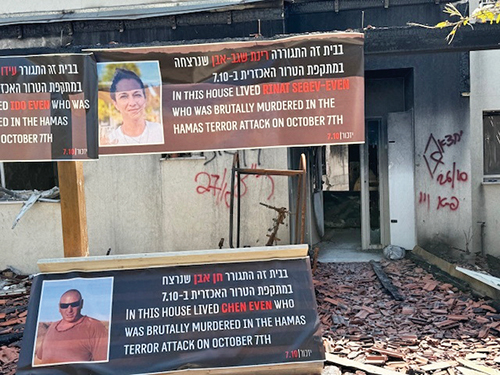
I am honored to serve on the executive of JAFI as well as the budget and finance committee, and greatly admire all my professional and volunteer colleagues who have worked so tirelessly trying to meet the unimaginable needs that face the State and people of Israel during these perilous times. Israel is not that huge of a country in the scheme of the world order. There are nearly 10 million citizens in the State of Israel and approximately 7.2 million Jewish citizens. The needs and the costs that have arisen out of the war due to the dislocation of more than 200,000 Israeli citizens are almost beyond enumeration and comprehension, as is the fact that tens of thousands of residential buildings must be rebuilt and refortified.
Much of the effort during these meetings was trying to address immediate short-term needs as well as future planning. This Gaza war is Israel’s longest war ever, and it continues. Sirens and rockets continue daily, and the almost-daily terror attacks within Israel—unsuccessful ones occur even more frequently—that the world and the hallowed United Nations is uninterested in even mentioning, much less addressing, have a detrimental effect on everyone (including visitors like me) but an even more significant impact on the youth. (Why is Israel the only country in the world that is supposed to accept and live with a certain “containable” level of terrorist activity within its borders?)
JAFI’s efforts to bring 1,500 Israeli teens affected by the war to camps around the world this summer is worth highlighting. The shattered Israeli youth need this respite. The campers will be coming in groups of 20 with staff and mental health support and professionals. As any Jewish adult who went to a Jewish camp knows, the experience creates lifelong friendships and creates the next generations of Jewish leaders.
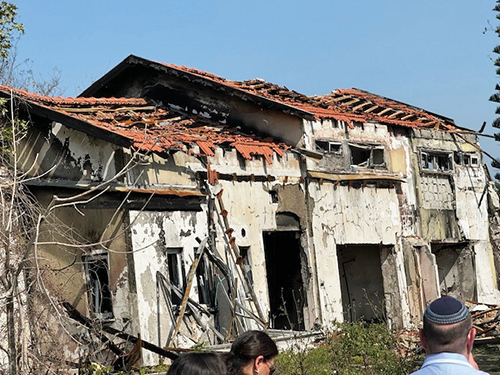
Also worth noting is JAFI’s Terror Victims Fund, which immediately shepherds emergency funds to terror victims’ families. There are nearly 10,000 victims of terror since October 7. There were, prior to the war, a total of 9,000 victims of terror during the fund’s entire previous existence. The fund previously had $3 million. Now, with the tremendous generosity of contributors from around the world, the fund has $110 million—and yet the needs are even greater than that. I proudly contribute to this fund and encourage everyone to consider doing so. Please go to www.jafina.org.
Ofir Sofer, Israel’s minister of aliyah and integration, reported to us that Israel expects 100,000 new olim by the end of 2024. This is not such a high number when you consider the rampant increase in violent antisemitism around the world. You may have thought that only Turkey, Venezuela and South Africa are the really inhospitable places for Jews to live. Would you be surprised to hear that speakers at the JAFI meetings told us that Australia has become a cesspool of extremism and that business leaders and their families are personally targeted? Is there any doubt as to why JAFI has 500 shlichim around the world, truly doing God’s work?
Beyond the committee meetings, there were many extremely emotional moments, which make it even more clear that without a strengthened State of Israel, no Jew anywhere in the world can be guaranteed his/her security or safety. No single meeting or speech, however, was as piercing as our meeting with Rachel Goldberg and Jon Polin, parents of hostage Hersh Goldberg-Polin. There is no one who more poignantly and concisely set forth the need for immediate increased and sustained action to demand and obtain the release of Hersch and all the hostages than Rachel and Jon. I truly do not know how Rachel and Jon (and every other hostage family) get up every morning, after not sleeping most of the night, and do it again and again, day after day. God bless them and may all the hostages be promptly returned to their families.
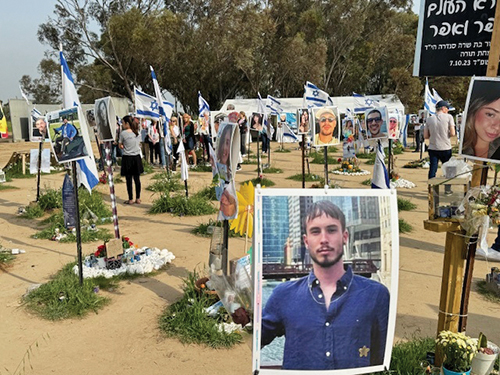
I also met twice during this trip with Rabbi Doron Perez, father of hostage Daniel Perez. You may recall that Rabbi Doron and Shelley Perez’s other son Yonatan was shot and significantly wounded on October 7, not more than 100 yards from where his younger brother Daniel was taken hostage from his tank. Rabbi Perez spoke movingly and rationally about the fact that while he and many other hostage families could understand the “ranking” of hostages during the first series of hostage “releases” several months ago, he and many others do not accept—nor should we—that there should be anything but a complete release of all hostages if there is any ceasefire deal and the release of terrorists from Israeli jails, especially if any terrorists with “blood on their hands” are to be released. Why should humanitarian aid be delivered into Gaza without forcing Hamas to release all the Israeli hostages it continues to brutally hold and abuse?
(Very, very sadly, on March 17, after the writing of this article, Captain Daniel Perez was declared a fallen soldier, his body having been taken hostage to Gaza on October 7. The news came to his family on 7 Adar, the yahrzeit of Moshe Rabbeinu, whose burial place is unknown, and has become a date associated with mourning for all those whose burial places are unknown. Daniel’s body continues to be held by Hamas terrorists in Gaza. May his memory be for a blessing and may his body be speedily returned for a proper kevura, burial.)
On the second day of the JAFI meetings, we embarked on a fact-finding visit to Kibbutz Be’eri, the site of the largest loss of life on October 7. Kibbutz Be’eri was a very tough place to visit. As we entered into the kibbutz accompanied by the IDF, we saw a tented covered area (which we were not allowed to approach) where dozens of soldiers were literally sifting the dirt to find shards of bones or other fragments from which they might be able to establish the DNA of missing Israelis. The physical destruction of the structures in Kibbutz Be’eri was not that drastically different from what we had seen in Kibbutz Kfar Aza a few months earlier, but the stories in Be’eri were even tougher to bear. Most readers have heard or read details of the horrific violence inflicted by the Hamas terrorists, but it was uplifting to hear stories of courage, bravery and utter selflessness by ordinary Israelis who acted heroically, without any real weapons, to defend and help save family members and neighbors while ultimately giving up their own lives.
The Nova Musical Festival site, where almost 400 people were butchered, brought back tough memories from my previous visit; and the contrast between the beautiful fields with breezy winds blowing through the flowers and high grass and the devastation and wanton carnage that took place on October 7 could not be starker.
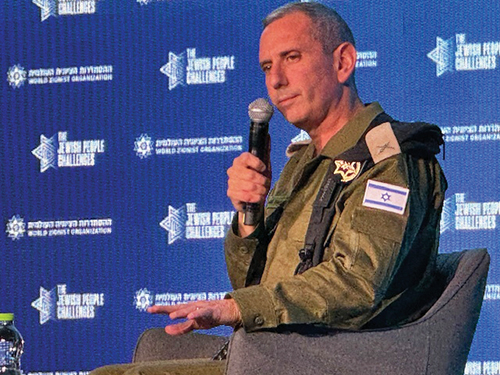
Later that day we visited the town of Sderot, which has continuously suffered under Hamas rocket attacks since Israel left Gaza in its entirety in 2005, and we heard many stories about the heartbreak and terror that occurred on October 7. We also saw videos and evidence of Hamas terrorists viciously tracking and gunning down innocent civilians, including women and children.
What was especially jarring to me was visiting the site of the destroyed police station in Sderot, now down to only foundation stone and cement, with just markers and wreaths in memory of all the policemen who were killed on October 7. In my earlier visits to Sderot after previous Hamas terror and rocket attacks, the police station was the one fortress that stoutly stood against evil; the station was especially proud of housing the endless, twisted remains of Hamas rockets that did not succeed in injuring or killing. Tragically, the October 7 massacre succeeded in destroying this fortress of Jewish pride.
The final day of the JAFI meetings included the closing plenary at which, among other inspiring speakers, we heard from Rear Admiral Daniel Hagari, the brilliant (post-October 7) IDF spokesman. Hagari set forth the case for Israel’s need to investigate, conduct due diligence and accurately report with integrity on all alleged IDF acts and incidents, even if there is delay in responding to the false media reports that we have all seen. A prime case in point, of course, was the outrageous reporting on the alleged IDF bombing of the Al Shifa Hospital which, as we all now know, was actually struck by an errant Islamic Jihad rocket.
After the closing plenary, we moved to the Binyanei Ha’uma (the Jerusalem International Convention Center) where we were privileged to participate in the Jewish People Challenges: Post-October 7th Global Leadership Meeting gathering and spend time with President Herzog. His speech setting forth Israel’s objectives and goals for this war was precise, clear and candid. He emphasized the need for the return of all hostages, quoting the Rambam’s dictate that there is no greater commandment than pidyon shvuyim (the redemption of captives). Herzog detailed some of his office’s activities and efforts in this regard as well as lauding the continuing unity of the Jewish people during this war.
The remaining two days of the week were devoted to the Zionist General Council Session XXXVIII/4 and meetings among the factions and organizations as well as additional site visits. The Zionist General Council gathering was the first in Israel post-October 7, and it was wonderful to see Zionist friends from all over the world.
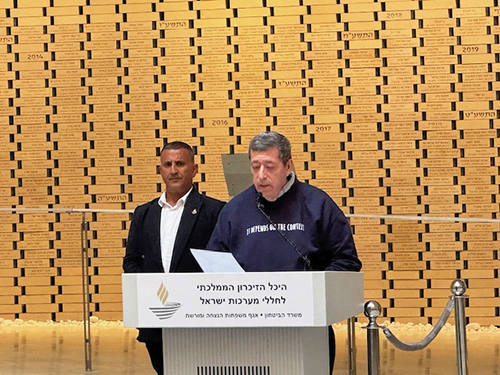
The most memorable site visit was to the Har Herzl National Memorial Hall, which opened in 2017 and honors all 24,857 (as of February 28, 2024) IDF soldiers and state security organization personnel who have lost their lives defending the State of Israel. A solemn, unadorned brick with identical, limited information (name and date of death) is installed in the circular ascending walls in reverse chronological order for each soldier or security officer who has fallen in defense of the State of Israel. October 7, 2023, now stands out as the single most catastrophic day in terms of loss of soldiers in Israel’s history, with over 300 soldiers killed.
The IDF tour guides are informative and the walking tour leads up to a very moving daily 11 a.m. tekes (ceremony) where the yahrzeit of those who fell defending the State of Israel on that particular date on the Jewish calendar are commemorated. On the day of our visit, the names of 37 fallen heroes were solemnly remembered and the Kaddish and El Maleh Rachamim prayers were emotionally recited by the IDF chazan.
On our tour, I noticed the most recent bricks that had just been installed that morning for the three soldiers who fell on January 30, including Yuval Nir. Sergeant Nir, a 43-year-old dedicated reservist soldier from Gush Etzion, was killed in Khan Yunis, leaving behind a wife and five children. I have 15 nephews and nieces who were in active IDF service or the reserves on and since October 7. Tragically, Sergeant Nir—not directly related to me, but the first cousin of one of my nephews serving in Gaza—fell in battle on January 30, 2024, 29 days before our visit. The individual bricks in Herzl Memorial Hall are installed on the 29th day after a soldier has fallen so as to be properly in place for the shloshim memorial observance that many families come to attend. I was therefore extremely appreciative that the commanding officer allowed me to participate in the tekes by reciting a perek of Tehillim. Although I can’t say I really knew Yuval Nir, this fallen soldier, like all fallen soldiers, is part of our family and extended family and it was very emotional and a privilege to be able to participate in the tekes.
I spent the bookend Shabbat weekends in Israel in the beautiful town of Alon Shvut in Gush Etzion with my sister, who has lived in Israel for over 40 years and who raised all her (now) married six children there. Ten of her 12 children and spouses have served in the IDF—the remaining two served in Sherut Leumi. I was thrilled to see most of these nieces and nephews as well as all 15 of my grandnieces and grandnephews (on my sister’s side) who came to celebrate my sister’s birthday and the elevation to rank of IDF captain of one of my serving nephews.
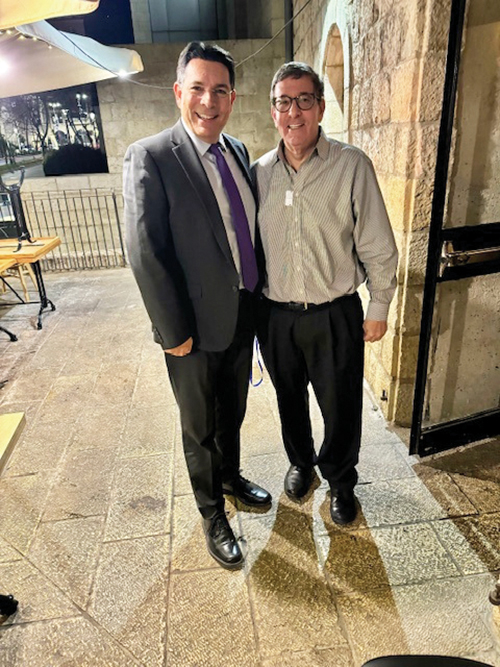
It was an amazing yet sober 10 days in Israel. My fondest wish and prayer is that when I return to Israel for my next trip, all the hostages will have been returned home and Israel will be victorious in its just war against Hamas.
Mark Levenson is a member of the Executive of the Jewish Agency for Israel and serves on its Budget and Finance and Government Relations committees; is a member of the Presidium of the Zionist General Council; and is vice president of the American Zionist Movement. Levenson is also on the executive committee of Teach New Jersey and on the board of the Religious Zionists of America. Levenson previously served as a presidential appointee to the United States Commission for the Preservation of America’s Heritage Abroad. He is a longtime activist for Israel and frequently speaks and writes on the topic.









